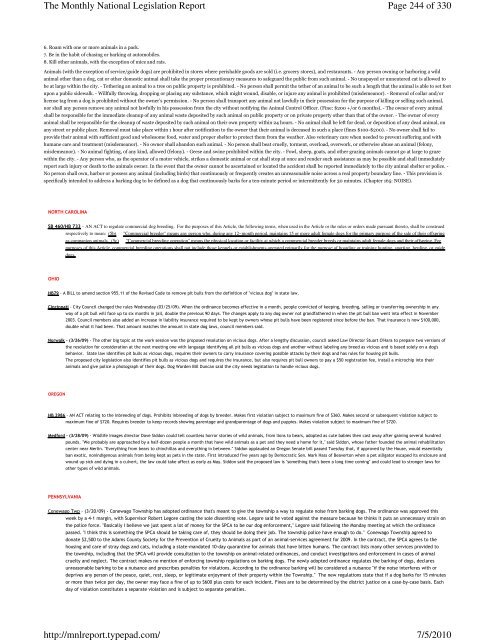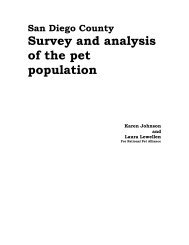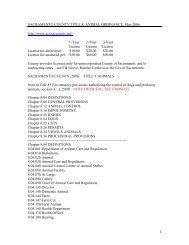Page 1 of 330 The Monthly National Legislation Report 7/5/2010 ...
Page 1 of 330 The Monthly National Legislation Report 7/5/2010 ...
Page 1 of 330 The Monthly National Legislation Report 7/5/2010 ...
Create successful ePaper yourself
Turn your PDF publications into a flip-book with our unique Google optimized e-Paper software.
<strong>The</strong> <strong>Monthly</strong> <strong>National</strong> <strong>Legislation</strong> <strong>Report</strong>http://mnlreport.typepad.com/<strong>Page</strong> 244 <strong>of</strong> <strong>330</strong>7/5/<strong>2010</strong>6. Roam with one or more animals in a pack.7. Be in the habit <strong>of</strong> chasing or barking at automobiles.8. Kill other animals, with the exception <strong>of</strong> mice and rats.Animals (with the exception <strong>of</strong> service/guide dogs) are prohibited in stores where perishable goods are sold (i.e. grocery stores), and restaurants. - Any person owning or harboring a wildanimal other than a dog, cat or other domestic animal shall take the proper precautionary measures to safeguard the public from such animal. - No unspayed or unneutered cat is allowed tobe at large within the city. - Tethering an animal to a tree on public property is prohibited. - No person shall permit the tether <strong>of</strong> an animal to be such a length that the animal is able to set footupon a public sidewalk. - Willfully throwing, dropping or placing any substance, which might wound, disable, or injure any animal is prohibited (misdemeanor). - Removal <strong>of</strong> collar and/orlicense tag from a dog is prohibited without the owner’s permission. - No person shall transport any animal not lawfully in their possession for the purpose <strong>of</strong> killing or selling such animal,nor shall any person remove any animal not lawfully in his possession from the city without notifying the Animal Control Officer. (Fine: $200 +/or 6 months). - <strong>The</strong> owner <strong>of</strong> every animalshall be responsible for the immediate cleanup <strong>of</strong> any animal waste deposited by such animal on public property or on private property other than that <strong>of</strong> the owner. - <strong>The</strong> owner <strong>of</strong> everyanimal shall be responsible for the cleanup <strong>of</strong> waste deposited by such animal on their own property within 24 hours. - No animal shall be left for dead, or deposition <strong>of</strong> any dead animal, onany street or public place. Removal must take place within 1 hour after notification to the owner that their animal is deceased in such a place (fines $100-$200). - No owner shall fail toprovide their animal with sufficient good and wholesome food, water and proper shelter to protect them from the weather. Also veterinary care when needed to prevent suffering and withhumane care and treatment (misdemeanor). - No owner shall abandon such animal. - No person shall beat cruelly, torment, overload, overwork, or otherwise abuse an animal (felony,misdemeanor). - No animal fighting, <strong>of</strong> any kind, allowed (felony). - Geese and swine prohibited within the city. - Fowl, sheep, goats, and other grazing animals cannot go at large to grazewithin the city. - Any person who, as the operator <strong>of</strong> a motor vehicle, strikes a domestic animal or cat shall stop at once and render such assistance as may be possible and shall immediatelyreport such injury or death to the animals owner. In the event that the owner cannot be ascertained or located the accident shall be reported immediately to the city animal shelter or police. -No person shall own, harbor or possess any animal (including birds) that continuously or frequently creates an unreasonable noise across a real property boundary line. - This provision isspecifically intended to address a barking dog to be defined as a dog that continuously barks for a ten-minute period or intermittently for 30 minutes. (Chapter 165: NOISE).NORTH CAROLINASB 460/HB 733 - AN ACT to regulate commercial dog breeding. For the purposes <strong>of</strong> this Article, the following terms, when used in the Article or the rules or orders made pursuant thereto, shall be construedrespectively to mean: (5b) "Commercial breeder" means any person who, during any 12-month period, maintains 15 or more adult female dogs for the primary purpose <strong>of</strong> the sale <strong>of</strong> their <strong>of</strong>fspringas companion animals. (5c)"Commercial breeding operation" means the physical location or facility at which a commercial breeder breeds or maintains adult female dogs and their <strong>of</strong>fspring. Forpurposes <strong>of</strong> this Article, commercial breeding operations shall not include those kennels or establishments operated primarily for the purpose <strong>of</strong> boarding or training hunting, sporting, herding, or guidedogs.OHIOHB79 - A BILL to amend section 955.11 <strong>of</strong> the Revised Code to remove pit bulls from the definition <strong>of</strong> "vicious dog" in state law.Cincinnati - City Council changed the rules Wednesday (03/25/09). When the ordinance becomes effective in a month, people convicted <strong>of</strong> keeping, breeding, selling or transferring ownership in anyway <strong>of</strong> a pit bull will face up to six months in jail, double the previous 90 days. <strong>The</strong> changes apply to any dog owner not grandfathered in when the pit bull ban went into effect in November2003. Council members also added an increase in liability insurance required to be kept by owners whose pit bulls have been registered since before the ban. That insurance is now $100,000,double what it had been. That amount matches the amount in state dog laws, council members said.Norwalk - (3/26/09) - <strong>The</strong> other big topic at the work session was the proposed resolution on vicious dogs. After a lengthy discussion, council asked Law Director Stuart O'Hara to prepare two versions <strong>of</strong>the resolution for consideration at the next meeting one with language identifying all pit bulls as vicious dogs and another without labeling any breed as vicious and is based solely on a dog'sbehavior. State law identifies pit bulls as vicious dogs, requires their owners to carry insurance covering possible attacks by their dogs and has rules for housing pit bulls.<strong>The</strong> proposed city legislation also identifies pit bulls as vicious dogs and requires the insurance, but also requires pit bull owners to pay a $50 registration fee, install a microchip into theiranimals and give police a photograph <strong>of</strong> their dogs. Dog Warden Bill Duncan said the city needs legislation to handle vicious dogs.OREGONHB 2986 - AN ACT relating to the inbreeding <strong>of</strong> dogs. Prohibits inbreeding <strong>of</strong> dogs by breeder. Makes first violation subject to maximum fine <strong>of</strong> $360. Makes second or subsequent violation subject tomaximum fine <strong>of</strong> $720. Requires breeder to keep records showing parentage and grandparentage <strong>of</strong> dogs and puppies. Makes violation subject to maximum fine <strong>of</strong> $720.Medford - (3/28/09) - Wildlife Images director Dave Siddon could tell countless horror stories <strong>of</strong> wild animals, from lions to bears, adopted as cute babies then cast away after gaining several hundredpounds. "We probably are approached by a half-dozen people a month that have wild animals as a pet and they need a home for it," said Siddon, whose father founded the animal rehabilitationcenter near Merlin. "Everything from bears to chinchillas and everything in between." Siddon applauded an Oregon Senate bill passed Tuesday that, if approved by the House, would essentiallyban exotic, nonindigenous animals from being kept as pets in the state. First introduced five years ago by Democratic Sen. Mark Hass <strong>of</strong> Beaverton when a pet alligator escaped its enclosure andwound up sick and dying in a culvert, the law could take affect as early as May. Siddon said the proposed law is "something that's been a long time coming" and could lead to stronger laws forother types <strong>of</strong> wild animals.PENNSYLVANIAConewago Twp - (3/20/09) - Conewago Township has adopted ordinance that's meant to give the township a way to regulate noise from barking dogs. <strong>The</strong> ordinance was approved thisweek by a 4-1 margin, with Supervisor Robert Legore casting the sole dissenting vote. Legore said he voted against the measure because he thinks it puts an unnecessary strain onthe police force. "Basically I believe we just spent a lot <strong>of</strong> money for the SPCA to be our dog enforcement," Legore said following the Monday meeting at which the ordinancepassed. "I think this is something the SPCA should be taking care <strong>of</strong>, they should be doing their job. <strong>The</strong> township police have enough to do." Conewago Township agreed todonate $2,500 to the Adams County Society for the Prevention <strong>of</strong> Cruelty to Animals as part <strong>of</strong> an animal-services agreement for 2009. In the contract, the SPCA agrees to thehousing and care <strong>of</strong> stray dogs and cats, including a state-mandated 10-day quarantine for animals that have bitten humans. <strong>The</strong> contract lists many other services provided tothe township, including that the SPCA will provide consultation to the township on animal-related ordinances, and conduct investigations and enforcement in cases <strong>of</strong> animalcruelty and neglect. <strong>The</strong> contract makes no mention <strong>of</strong> enforcing township regulations on barking dogs. <strong>The</strong> newly adopted ordinance regulates the barking <strong>of</strong> dogs, declaresunreasonable barking to be a nuisance and prescribes penalties for violations. According to the ordinance barking will be considered a nuisance "if the noise interferes with ordeprives any person <strong>of</strong> the peace, quiet, rest, sleep, or legitimate enjoyment <strong>of</strong> their property within the Township." <strong>The</strong> new regulations state that if a dog barks for 15 minutesor more than twice per day, the owner may face a fine <strong>of</strong> up to $600 plus costs for each incident. Fines are to be determined by the district justice on a case-by-case basis. Eachday <strong>of</strong> violation constitutes a separate violation and is subject to separate penalties.




